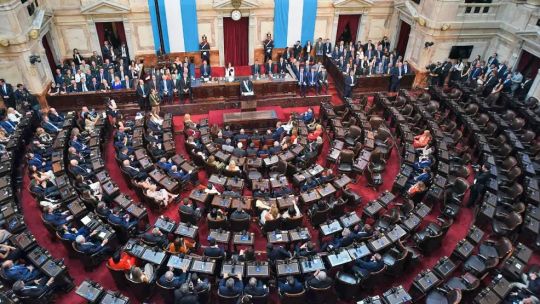
Argentina’s lower house, which will be refreshed this December will newly elected representatives, looks as if it will be even more polarised than at present.
La Libertad Avanza, together with its allies, will be the first minority in the new Chamber of Deputies come December with 107 members, although it will still have to reach agreements via dialogue with moderate caucuses to pass laws.
The Peronists will stay on 98 deputies but it remains to be seen if the single deputy from Tucumán for Independencia remains in that caucus or returns to Unión por la Patria (UxP)/Fuerza Patria.
It leaves a situation of extreme polarisation for the 257-seat Chamber of Deputies, which will have 107 pro-government members and 98 opposition Peronists.
The instant impact will be that Milei’s La Libertad Avanza will be able to safeguard presidential vetoes. Earlier this year, lawmakers reversed moves by Milei to strike down laws declaring an emergency for the disabled, paediatric care and the Garrahan Children’s Hospital and state universities.
LA LIBERTAD AVANZA
The ruling party will have 80 deputies, since 29 have terms running until 2027 while 51 now enter under the LLA label, more than doubling the current 37-strong caucus.
These new 51 deputies will be joined by 10 belonging to centre-right PRO and three from the Unión Cívica Radical (UCR) elected on the same list for a total of 64.
PRO will have 24 seats – it had a caucus of 35 deputies with 21 up for renewal, of whom 10 will now enter.
The other three allies are three “bewigged” Radicals, along with three more UCR deputies, with terms until 2027.
With the Radicals the government can count on 113 deputies and will need 16 more to reach quorum and pass laws.
LLA will need agreements with other caucuses open to dialogue, some of which have always accompanied the government – such as Innovación Federal (seven deputies), Producción y Trabajo (two) and Independencia (also two), apart from Verónica Razzini of Futuro y Libertad (Santa Fe).
It will also have to converse with the new caucus of Provincias Unidas which will have around 20 representatives, although its governors lost in five of their six provinces.
The ruling party, together with its PRO and UCR allies, won 17 seats in Buenos Aires Province, seven in the City of Buenos Aires, five in Córdoba, four each in Mendoza and Santa Fe, three in Entre Ríos, two each in Chaco, San Luis, Salta and Tucumán and single seats in Catamarca, Chubut, Corrientes, Jujuy, La Pampa, Santa Cruz, Misiones, Neuquén, Rio Negro, San Juan, Tierra del Fuego, La Rioja and Formosa.
FUERZA PATRIA
Peronism hung on to 46 of its 98 seats up for renewal, winning in seven provinces. The Justicialists picked up 16 seats in Buenos Aires Province with 15 at stake, three in Santa Fe when defending two, four in the City of Buenos Aires, three in Santiago del Estero, two each in Chaco, Catamarca, Entre Ríos and La Pampa with single seats in La Rioja, Formosa, Chubut, Río Negro, San Luis, San Juan, Mendoza, Corrientes, Tierra del Fuego and Tucumán.
INNOVACIÓN FEDERAL
Innovación Federal has eight deputies with three up for renewal, of which it held two (one each in Misiones and Salta). It will have seven representatives as from December.
PROVINCIAS UNIDAS
Provincias Unidas, the new vehicle of Argentina’s influential provincial governors, picked up eight seats – three in Córdoba, two in Santa Fe, one in Jujuy, one in Corrientes and another in the City of Buenos Aires (running as Ciudadanos Unidos) – while expecting eight more deputies from Encuentro Federal, three from the Radical splinter Democracia para Siempre and one from Por Santa Cruz.
They will also enter into conversations to join their caucus with the two MID deputies and some of the ex-libertarians of Coherencia like Carlos D’Alessandro of San Luis and Gerardo González (Formosa).
FRENTE DE IZQUIERDA
The left picked up three seats: two in Buenos Aires Province and one in Buenos Aires City, while another deputy has a term running until 2027 so it will have four seats of its current five.
COALICIÓN CÍVICA, COHERENCIA
Coalición Cívica also has a dwindling representation since it did not win a single seat while having two deputies with terms until 2027. Meanwhile, the Coherencia caucus has four members, all until 2027, with the same applying to the two MID deputies.
– TIMES/NA
related news
)
FUERZA PATRIA, INNOVACIÓN FEDERAL, PROVINCIAS UNIDAS, LA LIBERTAD AVANZA,





